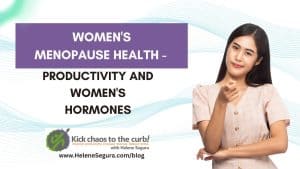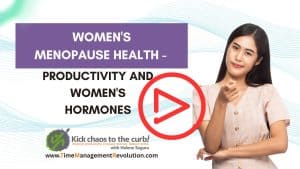Menopause & Productivity: Optimize Your Performance by Improving Your Hormone Health

If you’re here to watch the women’s menopause health webinar about hormone health that I mentioned in a brief video I plastered all over social media, click on the graphic below. I also encourage you to read what’s below because it took me entirely too long to learn all of that, and hopefully what I’ve shared will help you greatly scale back your “I’ve got to find a solution!” research time.
NOTE: The webinar is hosted by Designs for Health and is geared to medical professionals. I didn’t understand every single term, but it helped me create a list of additional questions for my doctor.
Have you ever noticed a pattern in conversations with women over 40? There is often a sharing of frustrations about unexplained changes: brain fog, joint aches, forgetfulness, inflammation, digestive issues, lack of sleep, mood swings, fatigue…the list goes on.
When I would ask my primary care physician about any conditions that I was experiencing, the answer was usually, “Your labs look good. We’ll just keep an eye to see if anything changes.” I didn’t feel I was being ignored, but I also felt like there was something going on that those labs weren’t revealing.
Even though I have close friends and clients who have lived through menopause before me and have been kind enough to share their experiences and advice, every single one of them had different symptoms, deficiencies and needs. I spent a couple of years (years!) trying to figure out what to do because experimenting with supplements that weren’t exactly what I needed was costing me time and money. Hopefully, the information you find here can help you navigate perimenopause and menopause much more easily.
READ THESE!
There were two readings that made me realize what I was experiencing was related to perimenopause and menopause:
It doesn’t matter what color your skin is or what your ethnic background is. I recommend you read this article to be aware of “non-traditional” start ages and symptoms. If you have a male in your life who doesn’t understand what’s going on with you, having them read this article might help them begin to comprehend. (None of my doctors had heard about the SWAN study!)
A client recommended this book to me. When I saw who the publisher was, I decided to take the plunge because I had instant trust. New World Library published my third book, The Inefficiency Assassin, so I know their rigorous vetting and editing processes well. I’ll be straight with you. I quickly became annoyed with the case studies that seemed more like veiled testimonials. However, the “cheat sheet” charts for deficiencies and nutrients were immensely helpful. I’ve also used the index to find information about my symptoms so I can develop questions for my doctor. There’s also a section on how to have conversations with loved ones, colleagues and supervisors about what you’re going through.
THE JOURNEY…
I am grateful to the clients who shared these resources with me. I finally had vocabulary I could use to formulate questions for my doctors. I also realized that I needed to find a medical professional who specializes in women’s menopause health because my gynecologist (who I assumed would know everything) wasn’t giving me the answers or guidance I needed.
My health journey next took me to a functional health doctor. I’d sought out this practice for helping me with chronic medical issues, and luckily for me, addressing my perimenopause symptoms became a secondary benefit. I was given an extremely thorough set of labs, which included a far more in-depth analysis of hormone levels than my primary care doctor and gynecologist had ordered. SO helpful!
I am in a much better place now health-wise, but I am still on the balancing journey. I love that my functional health doctor only makes recommendations after checking multiple numbers and asking various questions about what I’m experiencing. What I appreciate the most is that he doesn’t push Hormone Replacement Therapy (HRT) as the only solution. In fact, he prefers we go as natural as possible first (nutrition, stretching, exercise, and a few supplements) before going the HRT route, if that’s what I choose. My next step with him will be to sit down with a colleague he calls the “hormone whisperer” to gather more information about my hormone balancing choices. Because of what I’ve read and the conversations I’ve had with my functional health doctor, I feel much more confident about what questions and concerns I need to bring to the table, and far less overwhelmed by the thought of intaking additional information.
HOW THE HECK IS THIS RELATED TO TIME MANAGEMENT?
You might have caught on to my annoyance with all the time I’ve had to spend on learning about a phase of life that happens to all women. It’s ridiculous that not more is known and not more is shared. As a part of my weekly and daily plans, I had to factor in this time for research and doctor appointments so I wouldn’t overload my client and presentation schedule. I also had to adjust my work schedule because of my fatigue and inflammation. (Thankfully, I’ve needed to adjust my schedule again – this time in a much more positive way.)
Part of the productivity slow down for women over 40 can come from the symptoms they’re experiencing. The other part of the slowdown can come from confusion or worry about the changes, as well as stress from trying to figure out what you’re doing wrong in your workflow to cause the slowdowns and trying to hide this from your co-workers and supervisor.
One of the best things I did was let my husband and friends in on what I was going through. If my symptoms were going to affect a heavy presentation day, I’d let my client know about certain shoes I’d wear or certain breaks I’d take. It is a time-saver and an emotional relief to no longer hide these things.
I hope that if you’ve read this far, you have picked up at least a few tidbits that will lead you to some kind of relief.
I wish you the very best in your women’s menopause health journey!
For more ideas on how to cut back on lost time and be more efficient at work (even when you’re feeling down in the dumps), check out The Inefficiency Assassin: Time Management Tactics for Working Smarter, Not Longer.


